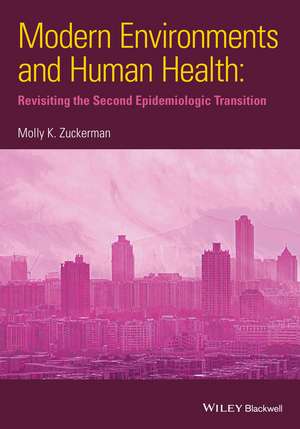Modern Environments and Human Health – Revisiting the Second Epidemiologic Transition
Autor MK Zuckermanen Limba Engleză Hardback – 15 mai 2014
Preț: 783.76 lei
Preț vechi: 1136.55 lei
-31% Nou
Puncte Express: 1176
Preț estimativ în valută:
150.04€ • 154.39$ • 126.48£
150.04€ • 154.39$ • 126.48£
Carte indisponibilă temporar
Doresc să fiu notificat când acest titlu va fi disponibil:
Se trimite...
Preluare comenzi: 021 569.72.76
Specificații
ISBN-13: 9781118504208
ISBN-10: 1118504208
Pagini: 416
Dimensiuni: 184 x 261 x 25 mm
Greutate: 1.04 kg
Editura: Wiley
Locul publicării:Hoboken, United States
ISBN-10: 1118504208
Pagini: 416
Dimensiuni: 184 x 261 x 25 mm
Greutate: 1.04 kg
Editura: Wiley
Locul publicării:Hoboken, United States
Public țintă
Graduate students, academics, and researchers in biological anthropology, history, demography, epidemiology and human biology; students and professors in courses on bioarchaeology, urban and historical archaeology, social history, economic history, and historical demography.Cuprins
Notă biografică
Molly K. Zuckerman is Assistant Professor in the Department of Anthropology and Middle Eastern Cultures at Mississippi State University. The author of numerous peer-reviewed publications, Dr. Zuckerman also teaches introductory courses in anthropology and biological anthropology, osteology, and human behavior and disease.
Descriere
Written in an engaging and jargon-free style by a team of international and interdisciplinary experts, Modern Environments and Human Health demonstrates by example how methods, theoretical approaches, and data from a wide range of disciplines can be used to resolve longstanding questions about the second epidemiological transition.
